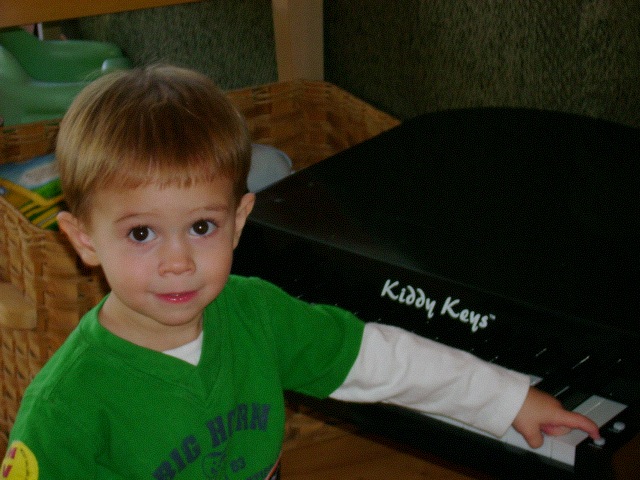NOTE: I originally published this article on my Psychology Today blog, Your Musical Self, earlier this week. I thought you may enjoy reading it, so am sharing it with you here today.
It’s finally here. I’ve been waiting for this research for a long time.
Have you ever heard of the Mozart Effect? The popular (and commercialized) version states that “listening to Mozart makes you smarter.”
Actually, the original research (published in Nature in 1993) had some fairly narrow findings. The researchers (Rauscher, Shaw, & Ky) had college-aged students take one of three tests of spatial-temporal reasoning. These tests, subsets of the standard Stanford-Binet IQ test, asked the students to visualize spatial patterns and, over time, to manipulate them. Additionally, there were three pre-test listening conditions: a Mozart piano sonata, repetetive relaxation music, and silence. When the student’s listened to the Mozart, they performed better on the spatial reasoning test. But it was a temporary improvement–the effect wore off after 15 minutes.
It should be noted that the researchers themselves made NO claims that listening to Mozart made people smarter. They presented their findings like any good researchers would, stating that listening to Mozart temporarily improved the spatial intelligence scores of college-aged students.
But over the next several years, the notion that “Mozart makes you smarter” grabbed hold of us. We liked the idea of a “magic bullet” approach. For the past 15 years, it’s been promoted in books (such as Don Campbell’s 1997 book The Mozart Effect: Tapping the Power of Music to Heal the Body, Strengthen the Mind, and Unlock the Creative Spirit) and turned into hundreds of DVDs, toys, CDs, and other products. And it seemed so easy–you turn on this “educational” video/CD/toy and your child will be the next Harvard valedictorian!
We finally have a follow-up study. Actually, there have been many follow-up studies, but we now have a summary of all those follow-up studies. Researchers at the University of Vienna (Pietschnig, Voracek, & Formann, 2010) performed a meta-analysis of nearly 40 studies. Guess what? They found no evidence that listening to Mozart’s music “enhanced” cognitive abilities in any way.
Now this doesn’t mean you should throw out every classical CD, DVD, and toy you own. It just means you just can’t expect brilliant results from your child by simply having him or her listen to or play with those materials.
However, there IS evidence that learning music and being involved in music helps improve a child’s math and language abilities. Additionally, there are tangible social benefits to being involved in music, as well as emotional and self-expression rewards.
So here are a few better ideas of ways to incorporate music in your child’s life that have some real benefit:
- Sing to your child. Singing is good for parent-child bonding, communicates emotional and regulatory information, and can be a vehicle for learning. Nervous about singing in front of your children? Don’t be! Your child loves you and loves your voice…no matter what you may think of it.
- Purchase child-friendly musical instruments. Young children learn through creative exploration and play. Have a box of instruments available to them and encourage them to explore their inner musician.
- Enroll in an early childhood music class. You will find an early childhood music class in almost any town. Some are provided by musicians, music teachers, or music therapists, others by instructors trained in a certain protocol (such as Musikgarten or Kindermusik).
- Pay for formal music lessons. There are some music programs that start training children as young as 3 or 4 in violin or piano (such as Suzuki). But generally children start taking formal lessons in the 3rd, 4th, or 5th grade. Even if your child doesn’t end up a professional musician, formal music training is one of the best things you can do for your child’s developing brain.
- Encourage participation in band, orchestra, or choir. Schools have ready-made music programs, many of which teach your child how to play the instrument (although I still recommend private lessons for maximum benefit!). This type of group ensemble participation provides wonderful social opportunities and encourages working towards your goals.
References
Rauscher, Shaw, & Ky (1993). Music and spatial task performance. Nature, 365, 611. Retrieved May 17, 2010 from http://www.nature.com/doifinder/10.1038/365611a0
University of Vienna (2010, May 10). Mozart’s music does not make you smarter, study finds. ScienceDaily. Retrieved May 17, 2010, from http://www.sciencedaily.com /releases/2010/05/100510075415.htm



 orcid.org/0000-0001-8665-1493
orcid.org/0000-0001-8665-1493






{ 5 comments… read them below or add one }
yay for this post 🙂
This is excellent! Thank you for posting this!
This is brilliant, Kimberly! Thanks so much for posting it! I’m going to try to pass the word (your words) around.
Also, 4/5 of your recommendations involve motor-engagement with a musical instrument. I’m thinking the motor aspect is an important part of the effect on math and language abilities.
Thank you so much, Barbara! I am very grateful and glad you like this material. ~Kimberly
What a wonderful, unexcited, to-the-point article, I stumbled upon while I foraged about the “Mozart effect”.
Thank you Kimberly from Austria 😉
eliZZZa
You must log in to post a comment.
{ 1 trackback }